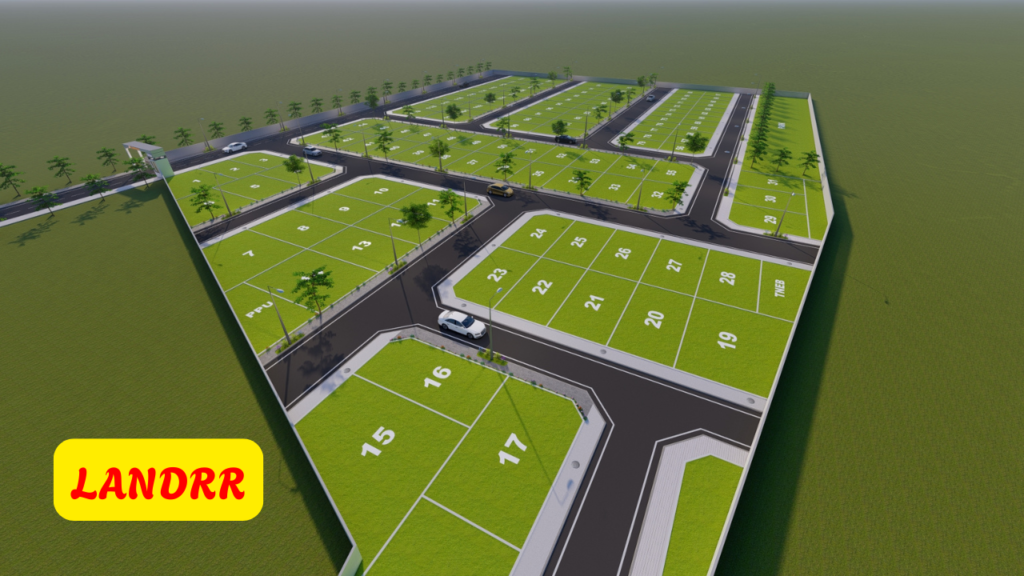This is a comprehensive guide to increasing residential plot value! Here’s that information restructured into a user-friendly description, keeping the key points and adding some formatting for readability:
11 Proven Steps to Skyrocket Your Residential Plot Value Before Selling
Selling a residential plot requires more than just sticking a “For Sale” sign in the ground. To attract buyers and command top dollar, you need to showcase your plot’s potential. Follow these 11 steps to significantly increase your plot’s value and ensure a smooth, profitable sale.
- Appeal to curb (detailed):
• Efforts: Do not just mood the lawn. Consider connecting flowering plants near the entrance or with boundaries. Choose low-rash, drought-tolerant strands for your climate. If the plot is large, consider creating a specified area for the future garden or playing area. Even if temporary, a well-defined Walkway can guide potential buyers and demonstrate the layout of the plot.
• Cleanliness: Beyond removing debris, consider the power to wash all areas or boundary walls. If there are old structures or remains of previous construction, they have been removed professionally. A clean conspiracy allows buyers to imagine their plans without distraction.
• Fencing: If a fence is present, check for any damage such as broken posts, missing slats, or corrosion classes. Repair or replace them. A fresh coat of paint or stain can revive the existing fence. Even a simple wire fence can define the boundaries and can make the plot feel more complete if no fence is present. Consider the neighborhood style when selecting the fencing material.
• Signage: Your “for sale” sign should be professional-looking, not handwritten. Include a clear phone number and consider adding a QR code that links to a webpage with more information about the property. Make sure the signal is placed where it is easily visible from the road.
- Improve Accessibility and Infrastructure (Detailed):
• Road Access: If the road is unpublished, grading it with gravel can lead to a huge difference. If it is too thick, consider contacting the local authorities whether road reform projects are planned. Clean any overgrowth vegetation along the road that can obstruct access.
• Utilities: Contact the relevant utility companies to inquire about the process and costs of adding water and electricity. Even if you do not connect them completely, the connection points marked and easily available is an important plus. If the field depends on wells, a well survey can be beneficial. Consider discovering the possibility of obtaining approval for septic tanks or other waste disposal systems.
• Drainage: To identify any such areas that accumulate water, inspect the plot after rain. Addressing drainage issues may include making drainage gap, filling in low spots, or installing drain pipes. Proper drainage prevents future problems and displays that the land is suitable for construction.
- Top of Form
- Bottom of Form

3. Highlight the Plot’s Potential:
• Mark Bounders: Use brightly colored bets or flags that appear. This helps buyers imagine the size and size of the plot. A survey map, even an old one, can strengthen this scene.
• Survey: A recent survey is priceless. It provides accurate measurements of the plot and identifies any ease or encroachment. This can later prevent legal issues and create confidence with the buyer.
• Zoning information: Contact the local zoning office to get a written document underlining the zoning rules for the plot. This should include information about permissible uses, height restrictions, setback requirements, and any other relevant rules.
• Conceptual plans (optional): They do not need to create detailed architectural images. Even simple sketches showing a potential home layout, garden, and driveways can help buyers imagine the ability of the plot. This can be particularly helpful if the plot has unique features or challenges.
4. Research and Price Strategically:
• Market Research: Look at the recently sold properties (within the last 6-12 months) which are equal to your plots in size, location, and facilities. Online real estate portals, local real estate agents, and public records can be auxiliary resources.
• Competitive pricing: Do not target for the highest price only. A competitive price plot is more likely to attract and sell several proposals quickly. Consider pricing slightly below market value to generate interest.
• Justification: Be prepared to explain their pricing strategy to potential buyers. Highlight the positive characteristics of the plot, such as its location, size, access to utilities, and any recent improvement by you.
5. Documentation and Legal Clarity:
• Apparent title: A title search is necessary to ensure that there are no liens, encumbrances, or other legal issues associated with the property. Add any title issues before listing the plot for sale.
• Property Documents: Organize all relevant documents including original sales deeds, property tax receipts, survey maps, and any approval or permit related to the land.
• Legal advice: Consultation with a real estate attorney is highly recommended. They can review all documents, advise you on legal aspects of sales, and help avoid potential problems.

6. Consider Professional Help (Detailed – Focusing on Real Estate Agents):
Selling land, especially residential plots, can be complex. A skilled real estate agent with expertise specializing in land sales may be priceless. Here is a wide eye that they can help and choose the right: What a real estate agent does for the sale of land (and why it is important):
• Market analysis and pricing:
Hyperlocal Knowledge: A good agent understands the nuances of the local land market, including recent sales of comparable plots (often more granular than home sales data), development trends, and even planned infrastructure projects. Which can affect the value. This knowledge helps determine the optimal listing value.
comparative market analysis (CMA) specific to land: They will consider soil types, accessories access to utilities, zoning rules, and even ideas, which are important for land evaluation and often ignored in general CMA Goes.
Pricing Strategy: Beyond setting only one price, they can advise on pricing strategies, such as if the price is slightly below the market to generate quick interest or for a higher proposal.
• Marketing and Publicity:
Lashed Marketing: Unlike homes, land often requires a separate marketing approach. Agents specialized in the land know where to advertise to reach developers, builders, and people looking for vacant land. They can use special land listing websites, local real estate networks, and even direct mail operations.
online appearance: They will create an online listing with high-quality photos (including air views if possible), plot features, and a virtual tour (if applied).
Networking: Installed agents have a network of contacts, including potential buyers, developers, and other real estate professionals who are interested in your plot.
7. Buyer Screening and Qualification:
Pre-uses: Agents can help make potential buyers pre-capable to ensure that they have the financial ability to buy land. This saves you time and effort to deal with unqualified possibilities.
Needs of the buyer: they will work to understand the specific requirements and requirements of potential buyers, which helps to match the right buyer for your property.

8. Conversation and Proposal Management:
Skilled conversation: It can be difficult to negotiate the sale of land. Agents are experienced negotiators and can help you get the best possible values and conditions for your plot.
Handling several proposals: If you get several offers, the agent can help you evaluate them and choose the best. They can also manage counter-offers and ensure a smooth interaction process.
Fixed hard assistance: They can guide buyers (and thus indirectly you) through the stipulated process, including soil testing, survey, and environmental assessment. This can help prevent deals from falling due to informal issues.
9. Closing and Transaction Management:
Paperwork and legal: Real estate transactions include too much paperwork. The agents are familiar with all the necessary documents and can ensure that everything is handled correctly.
Coordination with professionals: They can coordinate with other professionals involved in transactions, such as lawyers, surveyors, and title companies, to ensure a smooth closing.
Closing Assistance: They will guide you through the closing process and will ensure that all necessary steps are taken.
10. Choosing the right land agent:
• Experience with land sales: This is important. Do not just assume that any real estate agent can sell land. Especially ask about their experience with land transactions. How much land have they stopped selling? What kind of land have they sold?
• Local market expertise: They should have a deep understanding of the local land market. Ask them about recent land sales in the region and their insight on market trends.
• Network and connection: A well-connected agent has access to a broad pool of potential buyers. Ask about their network of contacts within the land development and building community.
• Marketing Strategy: inquire about their marketing plan for your specific assets. How will they reach potential buyers? Which online and offline marketing channels will they use?
• Communication and Availability: Choose an agent that is responsible for your call and email and informs you during the entire sales process.
• Reference and References: Ask for references to previous customers who have sold the land. Check online reviews and admirers to get a sense of their reputation.
• Commission Structure: Discuss their commission structure and ensure that you understand all the fees involved.
11. Key Questions to Ask Potential Land Agents:
- “How many land sales have you closed in the past year?”
- “What is your experience with selling residential plots specifically?”
- “Can you provide examples of similar plots you’ve recently sold and their sale prices?”
- “What is your marketing plan for my property?”
- “What are your fees and commission structure?”
- “Can you provide references from past clients who have sold land?”
By carefully selecting a qualified and experienced land agent, you’ll significantly increase your chances of selling your residential plot quickly, smoothly, and for the best possible price. Their expertise is invaluable in navigating the complexities of land transactions.
FAQ/ Frequently Asking Questions:–
- Q: What are the most cost-effective ways to increase my plot’s value? A: Focus on curb appeal (landscaping, cleaning), accessibility (road improvements), and highlighting potential (marking boundaries, providing zoning info). These offer the biggest return on investment.
- Q: How much should I spend on improvements before selling? A: It depends on the current state of the plot and the local market. A general rule of thumb is to spend only what you can recoup in the sale price. Prioritize essential improvements over purely cosmetic ones.
- Q: Does clearing the land significantly increase its value? A: Yes, a clean and cleared plot is much more appealing to buyers. It allows them to visualize their own plans and saves them the cost of clearing it themselves.
- Q: Are conceptual plans necessary, or are they just a have? A: While not strictly necessary, conceptual plans can be very helpful, especially for vacant plots. They can spark buyers’ imaginations and demonstrate the plot’s potential.
- Q: Should I get a professional appraisal before listing my plot? A: It’s a good idea to get an appraisal, especially if you’re unsure about the market value. It provides an objective assessment of the plot’s worth.

Accessibility and Infrastructure:
- Q: What if the road leading to my plot is in very poor condition? A: Even minor road improvements, like grading and adding gravel, can make a big difference. Contacting local authorities about potential road projects is also advisable.
- Q: How important is it to have utilities connected? A: Having utilities readily available is a major selling point. Even if they’re not fully connected, marking the connection points is beneficial. Buyers are often willing to pay a premium for plots with easy access to utilities.
- Q: What if my plot is in a remote area with limited infrastructure? A: Highlight the unique benefits of the location, such as peace and quiet, natural beauty, or potential for off-grid living. Provide as much information as possible about access to essential services.
Legal and Documentation:
- Q: Why is a clear title so important? A: A clear title ensures that there are no legal issues or disputes associated with the property. Buyers are hesitant to purchase property with unclear titles.
- Q: What documents do I need to have ready for potential buyers? A: Essential documents include the sale deed, property tax receipts, survey maps, zoning information, and any approvals or permits related to the land.
- Q: Do I need to disclose any known issues with the plot, even if they’re not obvious? A: Yes, it’s crucial to disclose any known issues, such as past flooding, soil problems, or boundary disputes. Failure to disclose can lead to legal problems later.
Pricing and Selling:
- Q: How do I determine the right price for my plot? A: Research comparable sales in the area, consider the plot’s features and location, and consult with a real estate agent or appraiser.
- Q: Is it better to overprice or underprice my plot? A: It’s generally better to price competitively or slightly below market value to attract more buyers and potentially generate multiple offers.
- Q: Should I hire a real estate agent to sell my plot? A: While you can sell the plot yourself, a good real estate agent can market your property effectively, negotiate offers, and guide you through the selling process. They often have access to a wider network of buyers.
- Q: How can I make my plot stand out from the competition? A: Focus on highlighting the unique features and benefits of your plot. Present it in the best possible light by improving curb appeal, providing clear documentation, and being transparent about any potential issues.
Specific Scenarios:
- Q: What if my plot is on a slope? A: Highlight the potential for a unique architectural design that takes advantage of the slope. Conceptual plans can be particularly helpful in this situation.
- Q: What if my plot is an irregular shape? A: Mark the boundaries and consider getting conceptual plans drawn up to show how a house could be positioned on the plot.
- Q: What if my plot is in a newly developing area? A: Emphasize the potential for future appreciation and highlight any planned infrastructure improvements in the area.
By addressing these FAQs, you’ll be well-prepared to answer potential buyers’ questions and increase their confidence in your property, ultimately leading to a more successful sale.

